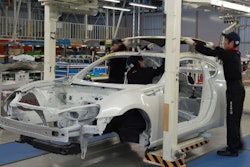HP last Thursday announced a partnership with consulting giant Deloitte in an effort to deploy 3D printing systems capable of supporting large-scale manufacturing operations.
Although 3D printing for decades helped companies develop new prototypes, officials from the two companies predicted that recent advances in materials and techniques would dramatically alter the economics of the technology -- and prompt manufacturers around the world to replace injection molding processes.
"We are truly here to change the world," Deloitte CEO Punit Renjen said during a press conference at HP's Palo Alto, Calif., headquarters.
The Silicon Valley tech pioneer, long known for its computers and conventional printers, introduced a 3D printer targeting the industrial sector last year.
HP President and CEO Dion Weisler noted that 3D printing is already more cost-effective than injection molding for lower quantities of goods. But better and cheaper materials in the future would allow significantly more products to be 3D printed while retaining those cost advantages.
Weisler said that HP's researchers can already alter the color, texture and even conductivity of 3D printed materials in a laboratory setting.
"What we have the opportunity here to do is disrupt a $12 trillion [global] manufacturing industry," Weisler said.
In addition to offering a more cost-effective option than injection molding, officials noted that 3D printers could ease the design process, reduce waste and curb excessive inventory -- as well as limit the need for warehouse space to store that inventory.
The relatively small system, meanwhile, would allow companies to take advantage of increasingly digitized manufacturing systems to create more flexible factories and supply chains -- including capitalizing on growing demand for customized goods.
"All of those things, when you combine them, enable manufacturing to happen anywhere in the world," Weisler said. "It democratizes manufacturing."
HP currently counts BMW, Johnson & Johnson, Nike and other prominent manufacturers among the users of its 3D printing systems, but company officials began talks with Deloitte in order to take advantage of the firm's extensive manufacturing and supply chain ties. Both companies work with manufacturing giant Siemens and software firm SAP.
Weisler said that the magnitude of the transition to 3D printing meant that, "it was going to be difficult for any one company to lead this transformation."
The partnership will begin in the U.S. before expanding abroad. Officials said that although manufacturers tend to be risk-averse, the competitive advantages of 3D printing would become too big to ignore.
Deloitte supply chain principal Doug Gish predicted that after decades of slow growth, 3D printing technology is rapidly approaching a tipping point in the broader economy.
"I believe you'll see 3D printing at scale operate, sort of like a lot of the technologies we've seen over the last several years, on an exponential curve," Gish said. "So over the next three to five years, we really expect to see this take off."






















